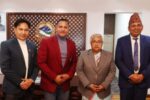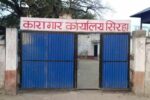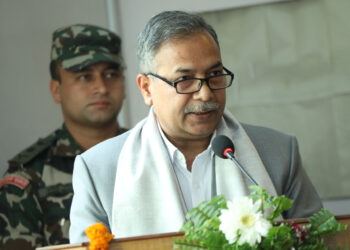The global population of persons aged 60 and over is rising dramatically – especially in regions that experience the greatest risks of natural disaster or conflict-related emergencies.
Headlines of the plight of older persons during the European heatwave of 2003 and Hurricane Katrina in the USA in 2005 shocked the world.
Meanwhile, Nepal ranks at number 30 in Help Age’s Disaster Risk and Age Index, which assesses the disaster risk faced by the elderly in 190 countries.
In developing countries like Nepal, their situation is generally much less widely known and their needs and contributions have been largely invisible.
Furthermore, we continue to experience aberrant climatic and geologic phenomena that can jeopardize older adults and disproportionately affect them.
Elderly people with low incomes, living in urban slums, or no social support network are among the groups most at risk of injury, dying or developing post-disaster health problems.
Recently, several provinces in Nepal have been experiencing flooding and landslides since July 9 because of heavy monsoon rains.
The Nepal Disaster Risk Reduction Portal reports more than 74 landslides and 15 flood events over the last week of July, with warnings for further flooding.
The gravity of this scenario means that preventing elderly people with one or more chronic health problems (arthritis, hypertension, heart disease, diabetes, respiratory disorders, etc.,), will become even more critical by undermining their ability to prepare, respond, and recover from the disaster.
Partly because of their decreased mobility, these individuals can often become isolated in their homes, leading to decreased communication and interaction with their local communities, including their health care providers.
In the meantime, in case of a disaster, older adults are more vulnerable for a variety of reasons: some depend on others to get away from the hazards or to receive the required help; others do not have easy access to community resources whereas some others have disabilities preventing them from hearing or complying with evacuation notices, or cannot fully understand and apply safety instructions stated by the local authorities.
Similarly, stress and chaos in a disaster situation are especially difficult for seniors with mental health conditions such as dementia. Most of the elderly, who are psychologically or emotionally distressed after a disaster, are not able to identify as having a mental health problem is yet another challenge.
Moreover, those who lived through traumatic experiences such as post-earthquake 2015, leading to several complications, low self-esteem, mental fall-out, economic hardship, social isolation, homeless, and even scary death.
It should be noted that they are also reported being particularly disturbed by having psycho-social problems due to slow recovery, loss of their loved ones, and difficulties in adjusting to their new environment.
It is important to understand the geographical setting, if our elderly loved one receives in-home care services or resides at a long-term care facility, be sure to ask their care providers what their protocol is for emergencies.
However, many Nepalese seniors live under the poverty line that means less access to resources, such as cellphones or tablets that might be helpful during emergencies.
Only a few of them can use email or social media to stay connected with their community. As a result, elderly people with low incomes, living in urban slums, or no social support network are among the groups most at risk of injury, dying or developing post-disaster health problems.
Despite this, they are disproportionately vulnerable to exclusion, stigma, and discrimination during the disaster phase.
Therefore, preparing older adults for disasters by following certain precautionary measures and designing comprehensive disaster management plans can alleviate some proportion of the physical, social, and emotional damage that occurs in these situations.
However, an important public health question is, How prepared are older Nepalese adults for natural disasters?
In recognition of the heightened needs of this subpopulation, self-empowering resources specifically tailored to seniors is most important.
Also vital is linking seniors with access to health care, social services, and food under both routine conditions and emergency conditions so they can stay healthy and prepared.
The elderly may not be tuned in to local weather reports, or they may be unaware of the severity of a storm or heatwave coming their way.
Much research has shown that seniors often contribute to the resilience of their communities after a natural disaster.
Therefore, there is a need for senior inclusion in community decision-making during emergency planning and intervention by including their experience and implications of indigenous knowledge in disaster management and preparedness.
Although home-ownership tends to be higher among older people, not all of the elderly live in safe housing, especially in rural areas.
Their houses tend to be older and less well maintained, which adds more prone to disaster.
Therefore, it is important to understand the geographical setting, if our elderly loved one receives in-home care services or resides at a long-term care facility, be sure to ask their care providers what their protocol is for emergencies.
Note, too, that single agency cannot manage such compounded risks; it needs to integrate a government-led endeavor in partnership with civil society, private sector, academia, and I/NGOs, and transboundary collaboration who have been the frontline warriors during natural disasters.
Along with that, age-friendly communities and local leaders should explore how current aging-in-place efforts can be harnessed to strengthen the disaster resilience of older adults.
Growing proportions of older adults, coupled with today’s increasing climatic and other disaster risks, will require serious public health and prevention planning and programs for effective community preparedness.
In addition to this, local organizations’ capacities for disaster management should be enhanced to integrate “age-responsive” action. Also, the involvement of gerontologists, geriatricians, geriatric nurse practitioners, social workers, or other aging experts is vital in all aspects of emergency preparedness and care delivery.
This is because support from outside affected areas cannot be expected on the same scale as before the COVID-19 era, considering travel restriction and overstretching response operations throughout the world.
Furthermore, the elderly may not be tuned in to local weather reports, or they may be unaware of the severity of a storm or heatwave coming their way.
One thing that caretakers can do to help is check-in to make sure that seniors are aware of any potential threats, avoid misinformation, and protect them from being abuse, and to encourage them to take appropriate action.
In conclusion, older adults are important assets to the nation and enhance society in many ways.
Growing proportions of older adults, coupled with today’s increasing climatic and other disaster risks, will require serious public health and prevention planning and programs for effective community preparedness.
(The writer is a Researcher Assistant at the Asian Disaster Preparedness Center (ADPC) Nepal)









Comment